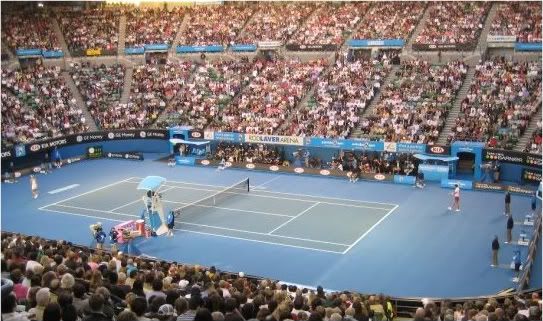The best tennis player who ever lived has given the gay marriage campaign a serve over the last few months. According to 62 grand slam title winner Margaret Court, gays need to go. Or at least be turned straight. Even fellow sports legend Warnie, who is annoyed at cyclists, has the sense not to suggest we turn all the bikes into cars. But with God on her side, the tennis player turned Christian preacher Reverend Court believes anything’s possible. And the idea of gay marriage, well that “violates their very own God given nature of what is right and what is wrong”.
The organisers of Rainbow Flags Over Margaret Court Arena disagree. They have launched a Facebook site to encourage tennis fans to “inundate Margaret Court Arena with rainbow flags during the Australian Open” in response to Court’s comments.
I went to Margaret Court Arena to show my support for the campaign on Day 4 of the Open but unfortunately there were no rainbow flags in sight. A competition for the most racist behaviour by someone in a Southern Cross onesie was being hotly contested, but no rainbows. This was probably because it costs at least $30 to go to the Open (the most expensive protest I’ve ever attended) and you can’t exactly just drop down to the local IGA and pick up a rainbow flag on your way to the tennis. Despite the limited presence in the stands, the campaign has received enormous media attention and provided an important organising space for people who support the issue.
The group has some powerful allies joining them in the media spotlight. Billie Jean King and Martina Navratilova, two of the greatest ever tennis players and longtime activists for gay and lesbian rights have spoken out against Court since her bigotry made the papers during the ALP conference debate in December last year. Navratilova told tennischannel.com at the time, "Her myopic view is truly frightening as well as damaging to the thousands of children already living in same-gender families.”
Ironically, Navratilova was invited to participate in a legends doubles match on Margaret Court Arena on the middle Sunday of the Open this year. She played the match but wore a rainbow ribbon on her sleeve. A media snub was carried out against the star, with Channel 7 showing no images of Navratilova, only images of the opposing team in their brief crosses to the game.
Navratilova and King have been gay rights campaigners for decades and groundbreakers in professional sport – which is one of the most homophobic arenas on earth. The segregation of males and females in pretty much every sport highlights difference between the genders and helps shape gender stereotypes: that women are fragile and meek and consequently female athletes can only be appreciated for their sex appeal, whereas men are strong and violent and should be appreciated for their skill level.
Failing to conform to these norms can be damaging to players as sports administrators and sponsors continue to subscribe to the erroneous notion that sex sells sport. Navratilova and King publically announced their sexuality in the early 1980s and lost millions in sponsorship as a result. Ever since, they have been heroes of the gay and lesbian community, paving the way for a stream of high profile lesbian players – such as Amelie Mauresmo, Gigi Fernández, Lisa Raymond and Renee Stubbs – to publically disclose their sexuality.
This year at the Australian Open, 18 year old player Laura Robson carried on their legacy by wearing a rainbow hair band for her match on Margaret Court Arena on Day 1. When asked why it was worth being involved in the controversy, Robson explained, “I believe in equal rights for everyone – that is why I wore it.” Robson played an important role in the campaign by being the only current player courageous enough to support the campaign publically.
No high profile male tennis players have been willing to stick their necks out for the cause. And despite Navratilova and King’s work in the field of sport, most sports have very few “out” professional athletes. The largest football code in Australia, AFL, has none. Sport often reflects the values within our society. It shows how entrenched homophobia is in our society and how far there is to go.
On the other hand sport actually helps shape homophobic ideas in society by giving justification for these inequalities. Margaret Court can use sport as a platform to promote her homophobic beliefs because her tennis achievements have given her a high-standing in the community. Precisely because of this it is important for her beliefs to be challenged in the sporting arena.
Tennis has made more ground in the area of gay and lesbian rights than many other sports. The players, fans and supporters of equality are right to do whatever is in our power to return Court’s serve and protect that legacy.
This article was first posted at the Socialist Alternative website.
Tuesday, January 24, 2012
Subscribe to:
Comments (Atom)
 RSS Feed
RSS Feed Twitter
Twitter



